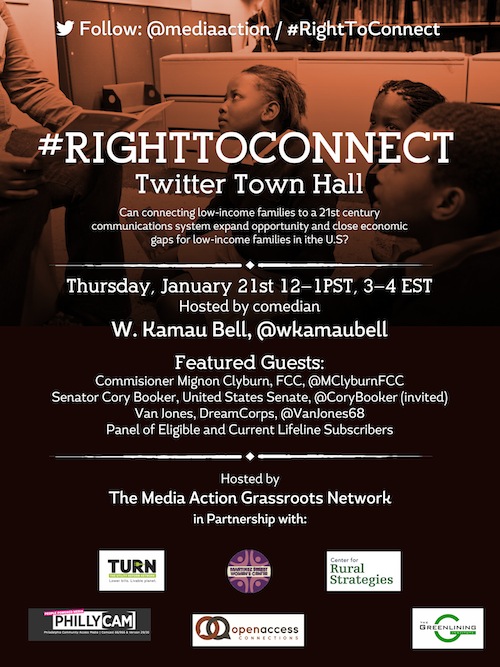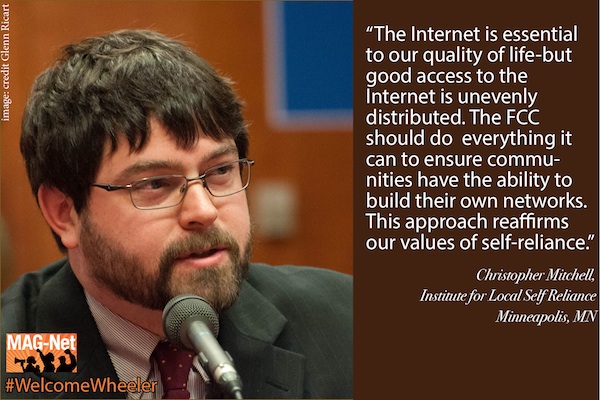
Fast, affordable Internet access for all.

As the threat to network neutrality seems imminent, an increasing number of local people are organizing grassroots groups and are looking for the best steps to start local initiatives. When you decide that your community needs to make a change that isn’t happening organically, it’s time to nudge that change along. Starting a grassroots movement with like-minded citizens will help educate the community, build support, and generate ideas as you all consider what is the best solution for your unique situation. We’ve talked with local folks over the years who have shared lessons learned with us and we’ve gathered together some of the best grassroots stories with resources to share.
Seek Out The Masters
Of course, there’s nothing better than getting tips from some one who’s already climbed the mountain. John St. Julien from Lafayette passed away in 2016, but his voice and work lives on. We interviewed him in the early days of the Community Broadband Bits podcast for episode 94 in 2014and he had some great advice on engaging other people in the community and keeping the momentum positive.
 We also obtained permission to archive and preserve some of the writings on the Lafyette Pro Fiber Blog, John’s brainchild he developed as Lafayette struggled against the many challenges by incumbents who wanted to preserve their monopoly.
We also obtained permission to archive and preserve some of the writings on the Lafyette Pro Fiber Blog, John’s brainchild he developed as Lafayette struggled against the many challenges by incumbents who wanted to preserve their monopoly.
Hanging’ With Buds
If you were not able to attend the #RightToConnect Twitter Town Hall on January 21st, you are in luck. The good folks at the Center for Media Justice campaign have collected some of the most memorable moments at Storify.
In addition to tweets from moderator W. Kamau Bell, memorable tweets from elected officials such as FCC's Jessica Rosenworcel, Mignon Clyburn, and Vermont Senator Bernie Sanders are on file to view. You can also link to stories of participants captured on video and audio and check out research material from organizers and participants.
In order to accurately describe the struggle endured by those without Internet access, organizers obtained stories from people who know firsthand what it's like. Here is Roxanne from Minneapolis:
As we move forward, universal access to fast, affordable, reliable connectivity must be a priority. Kudos to MAG-Net and partners for bringing this conversation online - the place where it needs to happen but least likely to occur.
On January 21st, join the Media Action Grassroots Network and its partners for the #RightToConnect Twitter Townhall. The event takes place at 3 p.m. EST/12 p.m. PST. The conversation will focus on lifeline and finding ways to bring more low-income families online. MAG-Net and partners will bring together a number of those families with elected officials and advocates pursuing change.
The event will be hosted by comedian W. Kamau Bell, @wkamaubell. Guests will include:
RSVP for the event, share the announcement with your friends, and send your questions to angella@mediajustice.org. Check it out, participate, be heard.

At MuniNetworks, we often focus on access to the Internet, but the impact of telecommunication policy extends beyond data. In 2016, families might finally see reasonable prices for phone calls to incarcerated loved ones.
Last October, the FCC voted to close loopholes and cap rates for Inmate Calling Service providers in jails and prisons across the nation. While incarcerated, folks couldn’t choose their long-distance service provider, and the prices these Inmate Calling Service providers demanded could reach up to $14 a minute. Although the FCC had some regulations in place, they did little to prevent add-on fees and service charges.
These charges proved absurdly expensive for low-income people, disproportionately impacting people of color. As if that wasn’t bad enough, people with disabilities found that the Telecommunications Relay Service (which enables people with hearing or speech disabilities to use the phone) was sometimes considered an add-on. The FCC's decision puts a stop to any extra charge for this necessary service.
We’ve covered the monopoly power that these providers have over incarcerated folks for some time. In Community Broadband Bits Episode 20, Chris spoke about prison phone justice in more detail with Amalia Deloney of the Media Action Grassroots Network and the Center for Media Justice. Deloney explained the many ways Inmate Calling Service providers exploit incarcerated people and the families.
The Media Action Grassroots Network recently launched a fall campaign, Fight for Our #RightToConnect, an appeal to the FCC to expand the Lifeline program to include coverage for broadband and to place a cap on prison phone rates. From MAG-Net:
Right now the Federal Communications Commission (FCC) is working on two issues that could dramatically help close the gap on some of these disparities. First, the FCC is considering reforms to the prison telephone industry that would establish an affordable flat rate for all phone calls out of jails, prisons and detention facilities, ending a practice of price gouging. Second, the FCC is planning on modernizing a low-income program known as Lifeline, which would help low-income families afford an Internet connection at home.
We want to urge the FCC to move forward on both of these issues, which is why members of the Media Action Grassroots Network are kicking off a “Right to Connect” initiative. During the next few weeks, we’ll be educating our communities on Lifeline and Prison Phones and encouraging people to take action on both of these issues. Our activities will culminate with a 15-person delegation that will travel to Washington D.C. to meet with members of Congress and the FCC to demand they support our communities. Want to join us?
Take a few moments to sign MAG-Net's petition, which will be delivered to the FCC on October 6th-7th.
MAG-Net has produced a #RightToConnect Outreach Kit with sample blasts, social media suggestions, and images that can help raise awareness.
Share the campaign on Facebook and Twitter to get the word out. For more information on what you can do, contact Steven Renderos at steven@mediajustice.org
The Media Action Grassroots Network (MAG-Net) recently hosted a Community Cohort Call titled Tech In The City: A Conversation About Community Broadband Access. Chris Mitchell, Andrea Figueroa Martinez, John St. Julien from Lafayette, and other community broadband advocates discuss the current state of U.S. broadband infrastructure.
Chris offers perspective on monopolistic behavior from current mega providers and how they find ways to limit our options. What can we do to counteract the powerful cable and telecommunications lobbies to preserve an open and free Internet? How can we guarantee affordable access? This panel discussion looks at long-term strategies and actions we can take now.
On March 18th, our own Chris Mitchell will host a webinar that you don't want to miss. Tech In the City: A Conversation About Community Broadband Access will be an engaging discussion about municipal networks in light of the recent Verizon v. FCC decision. The court delved into the FCC's authority, clearing up ambiguities from past decisions.
The event, presented by the Media Action Grassroots Network (MAG-Net)'s Community Media Cohort begins at 11 a.m. Pacific / 2 p.m. Eastern. From the event announcement:
Earlier this year, a court order ruled against the Open Internet also known as network neutrality. However, this same order reaffirmed the FCC's role ensuring that communities and cities can create their own broadband infrastructures.
In the last decade hundreds of communities across the U.S have started their own community broadband networks via local governments, cooperatives, or other nonprofit arrangements. But cable and telephone companies, like Comcast and Verizon have a history of redlining in low-income, rural, historically marginalized communities. Led by cohort leader and community broadband expert, Chris Mitchell of Institute for Local Self Reliance, we will have a dialogue about what we can do to protect the future of community broadband networks.
RSVP for the event and spread the word!

On August 14th, Christopher Mitchell and I visited Senator Amy Kobuchar's office in Minneapolis. We arranged the meeting in coordination with Free Press and the Media Action Grassroots Network to talk with our Senator about the Television Consumer Freedom Act, also known as S.912.
Senators John McCain (R-AZ) and Richard Blumenthal (D-CT) are sponsoring this effort to scale back cable program bundling. ILSR and the Free Press recognize this as a good start to reforming our deeply flawed video market. We also see it as a foothold to inching closer to the wide ranging and affordable broadband we desperately need.
We met with Senate staff to present 594 Minnesota petition signatures in support of the legislation. Free Press has collected over 27,000 signatures from across the country asking Congress to pass the Television Consumer Freedom Act.
The bill provides options for consumers beyond today's restrictive bundled services. By offering channels a la carte, consumers can pay for what they want rather than being forced to pay for many channels they do not. Bundling also limits independent channels by crowding out capacity and creating onerous financial barriers for entrepreneurial media ventures. This bill will not eliminate bundling, but will require cable providers to also offer a la carte pricing. It is important to note that the cable companies themselves are often forced to bundle by channel owners like Viacom or Disney. This bill restricts that practice as well.
We also give two thumbs up for the sports fans' provision in the bill. From an LA Times opinion piece written by Senator McCain:
Another provision in the bill seeks to end the practice of sports team owners punishing fans by blacking out home games that don't sell out. It provides that games taking place in publicly financed stadiums can't be blacked out.
In October, Media Action Grassroots Network (MAG-Net), hosted the panel discussion Community Broadband as a Path to Thriving Local Economies and Neighborhood Development as part of their Digital Dialogue series. As you may remember, our Christopher Mitchell was scheduled to participate. While Chris very much was looking forward to the opportinty to present, Delta Airlines had other plans for him.
Even though Chris was detained and not able to participate, the conversation was informative and worthwhile. If you missed it, you can now listen to it from the MAG-Net website. The conversation is just about an hour long and includes as speakers: